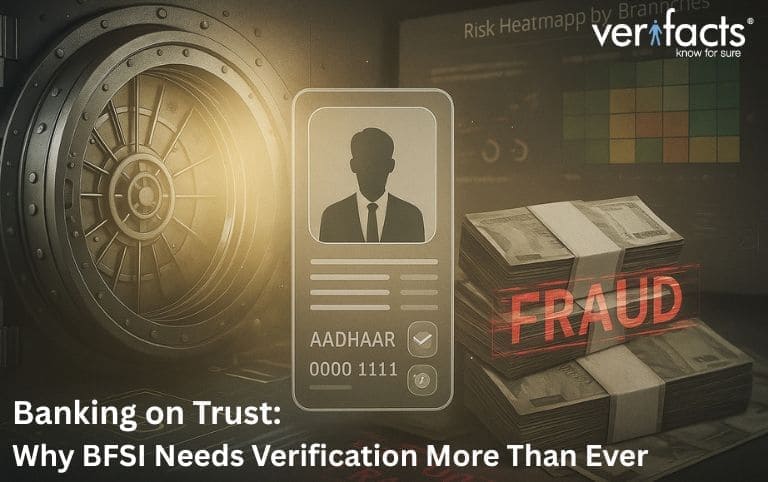
In the fast-paced world of the Banking, Financial Services, and Insurance (BFSI) sector, where speed often trumps all, one thing is crystal clear: fraud moves faster. Whether it’s fake credentials, fraudulent loans, or data manipulation, the cost of a missed red flag is not just financial — it’s reputational. And in today’s highly regulated and competitive market, trust is everything. As fraud becomes increasingly sophisticated, the need for robust verification mechanisms has never been more urgent.
The statistics surrounding fraud within the Indian BFSI sector are sobering. In 2024, Indian banks reported a staggering ₹3,000+ crores in fraud losses, a significant portion of which stemmed from loan scams and fake credentials. These aren’t isolated incidents; they reflect deep-seated issues that have been systematically exploited for years. Globally, financial institutions allocate nearly 10% of their operating budgets to compliance and fraud mitigation. This highlights the enormity of the problem — and the growing need for preemptive actions.
One key takeaway here is that one missed red flag is never a small oversight. It’s a direct hit to the margins, reputation, and trust of an institution. Fraud doesn’t just impact the balance sheet — it erodes the foundation on which customer loyalty and trust are built.
Even the most trusted financial institutions aren’t immune to lapses, often at the hands of internal and external actors. Here are some of the most critical cracks that can appear during the onboarding and operational phases:
- Loan Processing Staff with Hidden Job Histories: The hiring of individuals with undisclosed or dubious work histories can lead to internal fraud, compromised loan approvals, or even negligence in the approval process.
- Outsourced KYC Agents Cutting Corners: Know-Your-Customer (KYC) processes are essential for identifying and mitigating financial crimes. However, outsourced agents under pressure to meet targets may compromise the integrity of these checks.
- Duplicate Aadhaar IDs Used Across Branches: The proliferation of fake or duplicate Aadhaar IDs can be an entry point for fraud, especially when checks are inadequate or manual processes are flawed.
- Ghost Addresses Left Unchecked: Ghost addresses — where fraudulent applicants provide fake or non-existent addresses — are often overlooked during the verification process, creating opportunities for identity theft and financial scams.
These aren’t just random incidents. They are recurring patterns within the sector, with serious and long-lasting consequences. If left unchecked, these issues lead to increased Non-Performing Assets (NPAs), regulatory penalties, and significant damage to a bank’s reputation.
As the financial landscape becomes more complex, regulatory frameworks are tightening, and compliance is no longer optional. In India, the Reserve Bank of India (RBI) has implemented stricter onboarding obligations, demanding greater vigilance during the hiring and onboarding process, especially when it comes to KYC and anti-money laundering (AML) checks. The Digital Personal Data Protection (DPDP) Act (2023) has further heightened the pressure on BFSI institutions to ensure strict data accountability and transparency.
For BFSI leaders, this presents a harsh reality: Compliance is the foundation of customer trust. It’s not just about avoiding penalties; it’s about building credibility in a market that values security, transparency, and reliability. As data breaches and fraud schemes continue to rise globally, stringent compliance protocols will define which institutions thrive — and which ones falter.
In this environment of heightened risk and regulation, Verifacts offers a comprehensive solution to safeguard financial institutions against fraud and non-compliance. With its cutting-edge technology and expertise, Verifacts ensures that BFSI leaders can take proactive steps in mitigating risks. Here’s how Verifacts can transform your verification processes:
- AI-enabled ID & Address Checks
Verifacts uses AI-powered algorithms to conduct real-time verification of customer IDs and addresses. These advanced systems can detect duplicate IDs and identify ghost addresses — red flags that are often missed in traditional verification processes.
- Vendor Due Diligence
Ensuring the integrity of third-party vendors is just as crucial as vetting employees. Verifacts conducts GST and MCA checks, reviews ownership trails, and examines SLA breach histories to assess the risk of outsourcing partners.
- Real-time Dashboards
With live status tracking, branch-wise risk heatmaps, and instant alerts, Verifacts provides BFSI organizations with the tools needed to monitor and manage their verification processes in real time. This enables faster response times and minimizes fraud exposure.
- Immutable Audit Trails
In today’s regulatory environment, maintaining accurate, immutable records is essential. Verifacts ensures that all verification actions are captured in defensible audit trails, ensuring DPDP-ready records for regulators, auditors, and compliance officers.
- Lower Fraud Exposure: Fewer fraudulent loan approvals and scams mean fewer Non-Performing Assets (NPAs) and reduced financial losses.
- Stronger Compliance Posture: By adhering to the stringent guidelines of the RBI, DPDP, and other regulatory bodies, financial institutions can avoid penalties, ensuring smoother operations and better audit outcomes.
- Faster Onboarding: Streamlined verification processes mean faster customer onboarding, helping institutions stay competitive while ensuring that every fact is verified for safety and compliance.
As fraud continues to evolve and the regulatory landscape becomes more complex, the BFSI sector must adapt by adopting more sophisticated and reliable verification mechanisms. Verifacts offers the tools necessary to protect against fraud, ensure compliance, and build customer trust.
Ultimately, the BFSI industry thrives on trust — and trust is earned by verifying facts, mitigating risks, and staying ahead of potential threats. By investing in verification, financial institutions can safeguard their future, ensure stronger compliance, and, most importantly, maintain the trust of their customers in an increasingly complex and risky environment.
In a world where fraud moves faster than ever, the best defense is a thorough, intelligent verification process (BGV). It’s time for BFSI leaders to bank on trust — by verifying it first. 🔒✅

